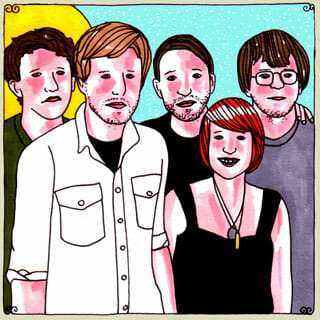- Welcome to Daytrotter
- Dead And Gone
- Be The Air We Breathe
- Petrified Forest
- Light Time
A telltale thematic that runs throughout a Lewis & Clarke album is one of poisoned offerings, of all “these dreams that don’t intersect” and a tendency for us all to explore this fogginess together, feeling our ways through the drizzling afternoons. Lou Rogai, the lead singer of this always expanding and contracting group from Pennsylvania, is one who wonders and wanders through these shattered and torn to shreds dreams of old men and young men, all the same. Some of them are his own, but he takes us to these sterling moments of washy clarity, where nothing’s at all certain or strict, just flowing and hushed. The songs on his latest, “Blasts of Holy Birth,” are just as much cast in “the golden light of ending day,” as they are cast in a pit of blackness that slumps down, quietly hiding and keeping to itself. Rogai doesn’t leave the walls bare, painting in abstract contrasts and dimensions that confer with one another to form shapely moves and poignant scenarios of slumbering worries. These worries seem to share a common denominator with the dread – or wanted solace – that could come when the bodily functions have weakened to the point that there’s nothing else for them to do but to just shut down and fade out the lights. There are numerous concerns about what it’s going to be like when all of this physicality of the present turns into some flimsy theory, some undefined newness. He has hopes for what becomes of it all after we die, and it’s a dominating process of weeding through what’s wanted and what disappointments might lay in their stead. A new song, “Petrified Forest,” is one that tackles many of these heavy thoughts and there are confessions and wishful thinking spinning slowly and in measured tones. It seems to be a song that could have been written as an ode to a child, one that you can see endless future in, endless love and all of it can be boiled down to one day being dead to this world and leaving someone so dear behind. It’s when faced with such human fears that the most hopeful of us think about the ways that we want it to be after the heart stops its beating. He sings, “There’s a song in the river/She told us she heard it along with the voices/They whisper and murmur/But she won’t believe them/She wants control of the evil devices that float on one’s shoulders,” and it’s like a desperate lunge or grab for any possible control over inevitability and the misguided thought that heads and brains control much of anything. An old, religious zealot on a local radio broadcast that aired here yesterday afternoon, told a story of a health nut who spoke to large groups about the importance of exercise and being healthy, but when he was diagnosed with cancer, he killed himself because he couldn’t deal with the fact that he couldn’t control his body any longer. It was supposed to illustrate the importance of giving oneself over to the scripture and anything it said. We can’t be sold on that, but Lewis & Clarke music wants to believe in some of that reflective magic and Rogai wants it for the rest of us too.
